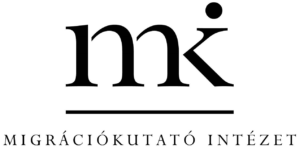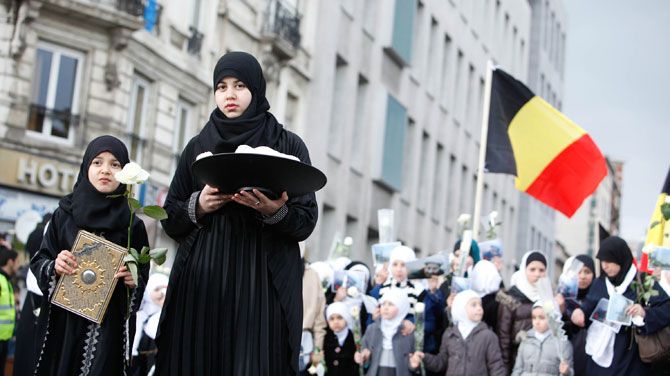
Green, Red and Blue: Brussels in Disarray
In early January 2017, the major French speaking Newspaper Le Soir in Belgium, together with the public French speaking TV and Radio group RTBF, conducted a survey of Muslims in Belgium entitled “Black, Yellow, Blues”. It must be said that both Le Soir and RTBF are liberal-leftist tendencies and are not known at all to be critical of migration or Muslim communities. Therefore, the published results were surprising and even shocking, and were harshly criticised by the leftists and the liberals. Naturally, the publication was echoed in European media. It is my intention here to summarize the results and comment in the same time on most of the sections of the survey. As for the colours: green indicates Islam, red socialism, and blue the colour of the EU: Brussels being the major city of the survey, with a Muslim population of estimated at more than 25%, of socialist pro-migratory policies and the capital of Europe.
On Western lifestyle
According to the survey, 82% think that they adopt a lifestyle close to the Western lifestyle, which non Muslims endorse in their neighbourhood or in the city. A similar percentage, 80%, believe there should be a dialogue between Muslims and non-Muslims on all societal issues, including on ethics and values. The more people are educated, the more they believe in this dialogue. Yet, 33% say they do not like culture, manners and western lifestyle (women’s autonomy, eroticism, alcohol, etc.) only 49% do like it. Of course there is a contradiction here between the 82% who feel their lifestyle is close to Western lifestyle and the 51% who dislike the Western lifestyle or hesitate about it. We can explain this confusing result, by the fact that migrants do in general adopt certain Western daily practices, especially consumerism, and believe that such practices make them closer to the Western lifestyle. There is certainly similarity in many aspects, but it is the difference that matters here, and the difference is considerable, for example, with regard to the treatment of women. Moreover, close does not mean cohesive.
On Islamic law
This cultural fissure can be observed further in the result according to which 37% reject that a woman can marry a non-Muslim. Similarly, 34% condemn a man who marries a non Muslim woman. While in Western culture, a woman or a man are free to marry whomever they want, based on the human right of freedom, such endogenous marriage belief, considers the non-Muslim men and women as impure. Furthermore, 29% believe the laws of Islam are above the Belgian laws with 11% hesitating, while 60% believe the Belgian laws prime over Islamic law. Likewise, 34% prefer a political system inspired by the Koran while 26% are hesitating and 40% against such a system. At this level, nothing surprising as many other studies and surveys reveal that a third of Muslims in Europe are practicing, and a practicing Muslim leaves by Islamic law, and logically would prefer Islamic law over any other law. A Pew Research Center survey of Muslims in 39 countries found that most Muslims want sharia to be the official law: Afghanistan (99%) Pakistan (84%), Morocco (83%), Egypt (74%), Tunisia (56%), Malaysia (86%), Russia (42%), etc. Another poll by the British Channel 4 documentary, found 23% of Muslims in Britain want sharia law. Another survey by WZB Berlin Social Science Center among Muslims in Europe found that 66% believe sharia to be more important than the laws of the country they live in.
On Jihad
With concern to the departure to do jihad in Syria, a public subject in Belgium because of the important number of Belgian Jihadists, only 66% are afraid Muslim youth might be indoctrinated and recruited to go to Syria, and the rate is 74% among women. Only 50% believe that certain imams radicalise the young Muslims. The rest is either in disagreement, or does not know. 70% believe that the young jihadists are young men who feel abandoned in their societies, putting the responsibility on the society. 89% believe that the young people who go to jihad do not know the Koran’s teaching, while actually the jihadists follow the salafi interpretation of the Koran, the most current conservative interpretation of Islam. 91% strongly condemn the terrorist attacks but the rest either hesitates or approves the attacks. In order to combat terrorism, 52% sustain that conditions should be created for a deep reform of Islam that could lead to free it from current dominating dogmatic readings. (29%) think that no reform is needed.
On the silent majority and the active minority
The survey confirms a gap between a silent majority ( 2 thirds), which looks forward to a different interpretation of Islam that could allow them to live cohesively in European societies, and the active minority, which believes firmly in separation, cultural and social, and in confrontation. The two-thirds of Muslims who are less practicing feel attached to Islam through faith, family, and festivals. But the problem is that they are passive. They do not, therefore, have any impact on direct religious institutions, and they do not want to support an anti-fundamentalist Muslim reform movement. They wait for the others to do so. But if they let the third fundamentalist take over the interpretation and the management of Islam affairs, no progress is possible. Since the 1970s, in Europe, the practice and interpretation of Islam has been largely under Islamist and conservative influence. Fundamentalists build the mosques, sustain economically communities and have a “total” view of Islam, and that it is political system as much as it is a spiritual philosophy. One can not arrive at a different situation when it is always this fundamentalist view of discourses and practices that dominates in Muslim settings. One might be tempted to think that the silent majority can play a role in depoliticizing practice and discourse and restore dignity to Muslim spirituality, but there are four observable obstacles that do not seem to go away. First, denial which negates any moral responsibility over violence and its deep roots in the Muslims communities. Second, wishful thinking, whereby wishes of reform and modernisation are expressed without concrete steps in this regard. Third, passivity which is, as we know, that history is made by the active people, and a part of the silent majority follows the active minority, because the latter develops strategies of dissuasion and persuasion able to act over the passive minds. Fourth, disengaging from communitarianism, a moral economic relation between Islamism and the silent majority. The biggest mosque in Brussels (Le Centre Islamique et Culturel de Belgique, CICB) spent 1.2 million euros in two years to fund predication activities in the city, and according to police, the Center donated 600 000 euros to Islamist associations and individuals.
Photo:http: //deredactie.be
